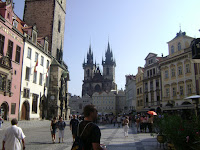



I chose to leave Vienna and venture out to both Prague and Bratislava on my free weekends so together I have named my weekend adventures: PRAGUEISLAVA. The two cities were very different on many levels, both from each other and Vienna, but I had a wonderful time in both cities. The first element that I would like to compare between the cities is the public transportation. I am personally a huge fan of public transportation both because of the easier it makes my life and how deprived I am of it in my daily life in America. The public transportation system in Prague looks somewhat older and more rundown than the Viennese system, but functions almost the same. There are large array of subway lines, streetcars, and buses that that can take you pretty much anywhere within and around the city, but I think I give the edge to Prague for a slightly larger reach to the outskirts of town. Bratislava is considerably behind in the public transportation realm. While we weren’t looking for the public transportation in Bratislava I didn’t notice any subway stations in the downtown area and the streetcars I did see ran extremely infrequently. On the whole Bratislava seemed to be much less developed and modernized than both Vienna and Prague, but had many more similarities to Prague. I think the close relation to Prague can be attributed to the fact that they were both part of the Soviet Union and thus both developed similarly.
It’s clear that both cities are not nearly on the same page as Vienna in infrastructure. I think a lot of this can be attributed to the many years that each city spent under Soviet control while neutral cities like Austria were developing and modernizing. I feel that Bratislava is the in the worst condition of all 3 cities and that may be a function of its greater history. Bratislava was for a period the capital of Hungary and is again now a capital city, but of Slovakia. The huge gap that existed in its place as the capital city of a country or empire could probably severely hindered its overall development as a major city. Both Vienna and Prague have always been major cities and capitals of either the Holy Roman Empire or their respective countries for centuries. This attention to the two cities would have brought huge amount of development on all levels that a non-capital city would have simply not been able to match. While the three cities have many similarities in composition and infrastructure, its clear that Vienna has clearly taken the lead, as their progress was not slowed by the oppression of the Soviet Union like in Prague and Bratislava.
The topic of oppression by ideologies is something felt and remembered by both Vienna and Prague. Vienna remembers the German occupation as a period where they were victimized by fascism while Prague memorializes those whose lives were lost at the expense of communist control as a part of the Soviet Union. Vienna’s “Monument Against War and Fascism” remembers all those that were victims in war from 1938-1945 as a result of the fascist government that controlled the German occupation of Vienna during this time. Prague’s “Memorial to the Victims of Communism” symbolizes the destruction of the person as a result of communism while the city was under the control of the Soviet Union. While both of these monuments are very powerful, I feel that they both are not quite accurate. Both monuments are in essence against the ideologies of communism and fascism in themselves, rather than the atrocities that were carried out in their name. While our generations understand that the memorials are for the Soviets and Nazis respectively because we are exposed to survivors of these groups, when these people are gone a distorted perception of history could arise. These monuments seem to unfairly brand both communism and fascism as ideologies with cruel intentions at their core, which is simply untrue. Both of these ideologies are not wicked at their core, they are simply easily abused. Perhaps these monuments should be erected in memory of the atrocities committed by the Nazi regime in the name of fascism or by the leadership of the Soviet Union in a communist government. Either way I agree that these victims should be remembered but perhaps the best way to go about it would be to erect a memorial similar to that at the Mauthausen camp warning people to “be vigilant”. These ideologies are not bad in themselves, it is only when people are allowed to gain power through them that these belief systems get unfairly bonded to the atrocities committed in their name.
No comments:
Post a Comment